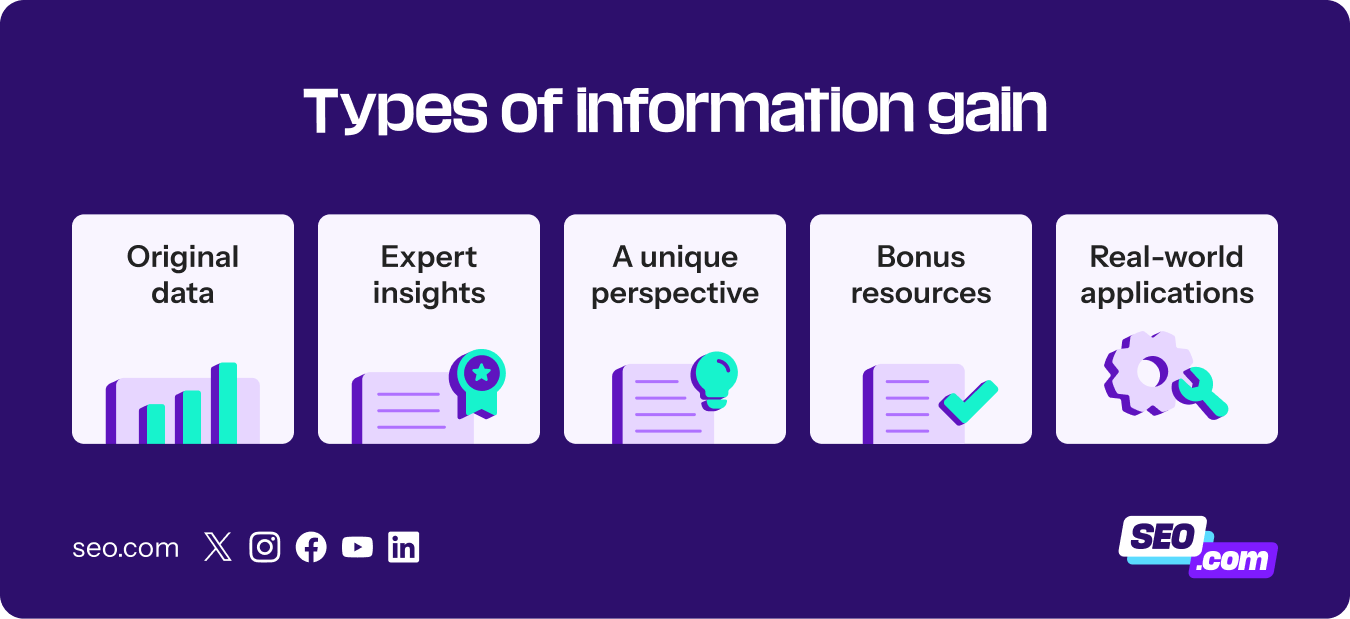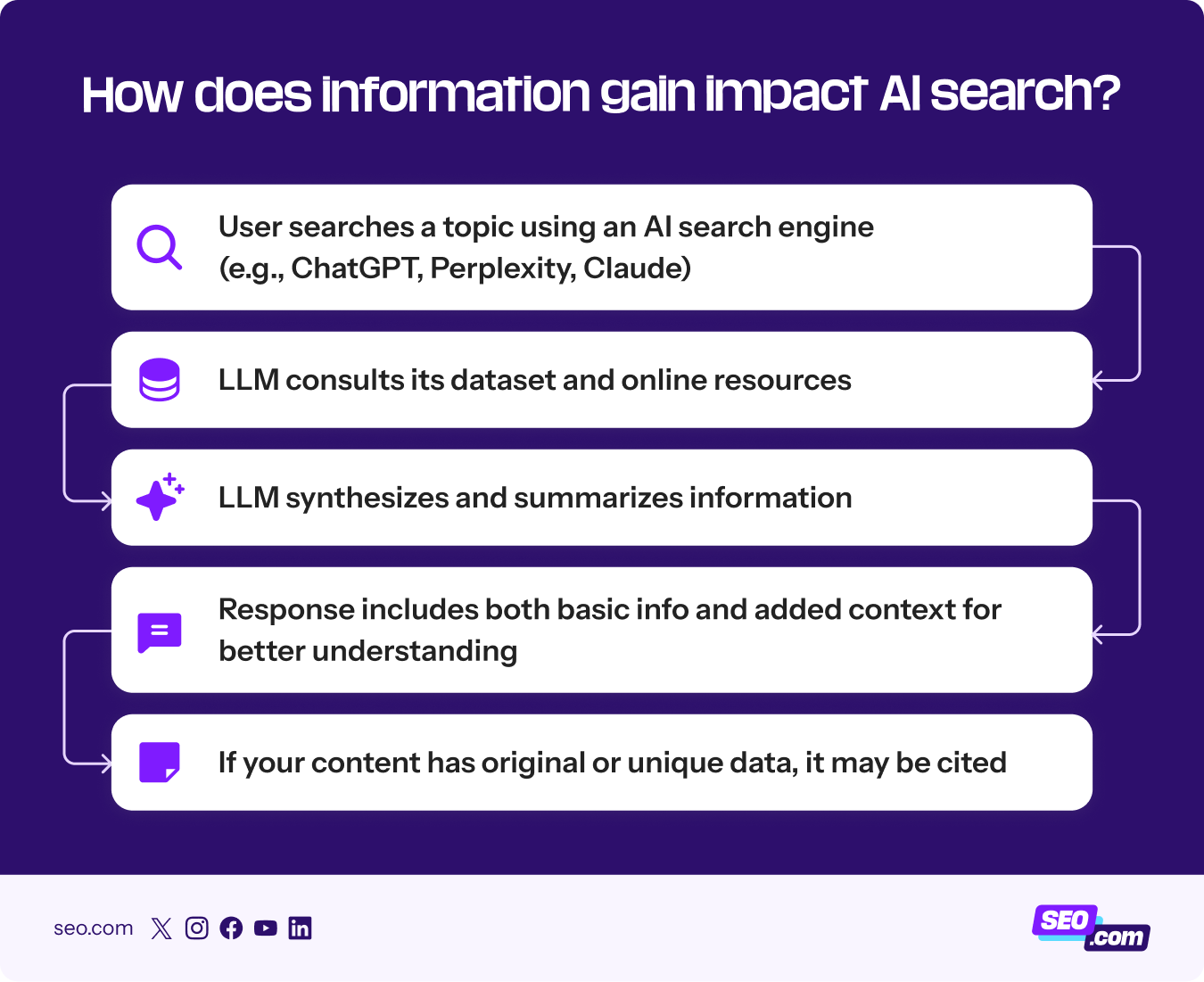- What is information gain in content? Information gain refers to unique, valuable information that your content provides beyond what competitors are already covering—like exclusive data, expert insights, or perspectives that readers can’t find elsewhere.
- Why does Google care about information gain? Google filed a patent in June 2022 for an “information gain score” that uses the amount of unique information in content as a ranking factor, favoring pages that add fresh perspectives over those that simply repeat existing information.
- What types of content create information gain? You can achieve information gain through original data from surveys or polls, expert insights from industry professionals, unique perspectives on topics, bonus resources like checklists or tutorials, and real-world examples that help readers understand practical applications.
- How does information gain affect AI search results? AI search platforms like ChatGPT and Perplexity favor fresh, original information when synthesizing responses—so content with unique data, expert insights, or information that fills gaps is more likely to be cited in AI-generated answers.
- Why is information gain increasingly important? As more businesses copy what’s ranking well in search results, pages become homogenized with identical information—creating no incentive for search engines or AI platforms to rank any particular page higher unless it offers something genuinely new or valuable.
Imagine for a second that your favorite celebrity recently had a baby. You’re dying to know what the baby’s name is. But every article keeps repeating the same information, none of which is the name of the baby.
Until you come across one article that reveals the name (and boy is it quirky).
That right there is information gain.
Information gain is when content adds additional, helpful information that other pages aren’t covering. In this case, adding the name of the celebrity’s baby is information gain – other tabloids didn’t have the name, but this one did! It’s a piece of knowledge that you gained that the other articles didn’t offer.
In the age of generative engines and AI content, information gain is becoming more critical for standing out in the crowd.
I’ll cover everything you need to know about information gain, including:
- What is information gain?
- Why does information gain matter?
- Does Google care about information gain?
- What can be considered information gain?
- How does information gain impact AI search?
What is information gain?
As the name suggests, information gain is the bonus information that you get from a piece of content. This means that it’s content that not everyone has on their page, or it’s content that people aren’t talking about with the topic. This content basically brings something new to the conversation to expand someone’s knowledge.
Why does information gain matter?
If you’ve written content before, you’ve likely searched the topic that you’re going to write about and then looked to see what pages are ranking in search results.
Based on what you find in search results, you create your content to contain similar information as what’s ranking well.
After all, if those pages are ranking well, it means that the information on the page is relevant and helpful to the user.
The problem is that because many other businesses take this approach, it leads to multiple websites publishing the exact same information without really adding anything to the conversation.
As a result, there is no incentive for search engines (or LLMs for that matter) to rank you higher or cite you over another page because you’re both saying the same thing.
With information gain, you’re creating an opportunity for your business to enter the conversation based on unique insights that you have to bring to the table on the topic.
Does Google care about information gain?
In a sense, yes, Google does care about information gain.
Back in June 2022, Google filed a patent for “information gain score.” The information gain score takes the amount of unique information in your content and uses that as a ranking factor when determining how to rank pages.
This patent enables Google to look at how much additional information that a user has not seen is being added to the conversation and use that to help rank pages.
While there isn’t anything officially out there about information gain score being part of the algorithm, it speaks volumes about the direction Google’s heading. It’s focused on the user and delivering information that goes beyond the basics and regurgitation of what others say.
That means that prioritizing the value add of your content will be crucial now and in the future.
What can be considered information gain?

There are a few things that you can add to your content to help achieve the goal of information gain and make your content stand out from your competitors:
1. Original data
Original data is one of the best ways to enhance your content because it’s data that only you have and no one else has.
If you conduct polls, surveys, or something similar, you can leverage that data to complement your content and help reinforce points that you’re making within the content.
Original data is a great way for you to give users that little extra nugget of information that they currently don’t have but are looking for. It’s also a great option because no other competitor will have the same data, which helps you stand out from other pages.
2. Expert insights
Expert insights is another great way to add unique value to your content.
If you surveyed 20 people at your company and asked them all the same question, you wouldn’t get the same answer. They all have different levels of experience and education that would influence their response.
That’s why expert insights are so valuable to creating uniqueness for your content.
Adding expert insights to your content allows you to bring a unique perspective to the conversation. It enables you to give readers access to information that they can’t get on any other page ranking in the search results.
You can have someone from your company speak about a certain section or topic within your content to bring their unique perspective to the conversation and enhance the reader’s knowledge.
When you give them access to expert insights from people who actively work in the field, you’re making your content more valuable than competitors’.
3. A unique perspective
When you search for certain topics, you may notice that everybody has the same perspective about that topic. You might see a wall of blue links, all saying the same thing about that topic.
Guess you just click on the first one, right?
After all, if there’s nothing standout about any of them, there’s no reason not to pick the first option.
But when you create content that offers a unique perspective, it can drive people to want to click on your listing vs. a competitor’s listing.
So, what does it mean to add a unique perspective to a topic? Adding a unique perspective means that you’re taking an angle or a route other content that’s ranking doesn’t take.
You can create information gain simply by considering a perspective that others aren’t mentioning in their content.
4. Bonus resources
Bonus resources are another great way to add some unique value to your content that can help you achieve information gain and outperform your competition.
These resources can be things like tutorials, guides, or checklists that provide practical value for readers, while also offering them something they didn’t have before.
You’ll need to keep in mind that, there are some topics where resources like this are readily available.
You may find that when you search your topic and look at the top-ranking pages, every single one of them has a bonus resource. So, adding one to your page wouldn’t help you stand out.
But, there are opportunities out there to add a unique bonus resource that others aren’t offering. It’s a great way for you to offer more value to the user while giving search engines a reason to rank you higher.
5. Real-world applications
Another great way to have information gain on your page is to take your topic and integrate real-world applications for it. While this won’t work for every single topic, there are topics out there where real-world application can help readers better understand the larger concept.
A lot of businesses will write content but don’t really show people how it applies to the real world. They share the information, show people what it means, and help them understand it.
But the important part is understanding how it applies to the real world.
So, a great way to create more value with your content is to provide those real-world applications. You can show how the topic you’re covering applies in a situation and help the reader better understand what it means.
A really common way to do this is to tell a story or to give an example. These two elements can show someone how a topic would apply in an actual situation so that they can better comprehend it.
For example, let’s say you’re writing a blog post about kitchen safety tips, and one of the tips that you’re writing about is washing your hands after handling raw meat or poultry.
You could just write that section and leave it at that, but an example could help enhance why this is so important.
You may write something like,
“Washing your hands before and after handling raw meat allows you to decrease the germ spread and keeps you from contaminating other surfaces and foods. Imagine if you handled a piece of steak and didn’t wash your hands. Everything you touched after that would have germs from that raw meat on it. Think about all the things you would touch after that in the process of making the steak: The pan, your cooking utensil, the counter, the stove knob….even your face as you wipe away sweat! All of those areas would now have germs that could lead to serious illness.”
This real-world example enables the reader to understand what happens if they were to neglect this food safety tip.
So, overall, adding real-world examples can give your content a unique element that helps readers better comprehend the topics you write about.
How does information gain impact AI search?

The concept of the information gain isn’t just limited to traditional search engines. It has real impacts on AI search engines like ChatGPT, Perplexity, and Claude.
But how?
First, it’s important to understand how LLMs like these operate. When someone uses an LLM to conduct a search on the back end, that AI search platform is consulting its dataset and online resources to then synthesize the information and create a summarized response for the user.
Not only are these LLMs pulling the basic information that every page has on the topic, but they’re also adding in additional information that helps with context and enhances understanding.
For example, if someone is searching a specific topic, and you have original data on that topic, your data may get pulled in and cited in LLM responses because it helps support the information.
AI tends to favor fresh, new information versus what’s already out there. So, if you’re creating original, helpful content, it can help increase your chances of ranking in AI search results.
Additionally, if there are topics in your niche that people don’t dive into too deeply, it’s an opportunity for you to fill in information gaps, which can help you get cited in AI search results. If other businesses aren’t sharing this information, but you are, AI search engines will be more likely to cite you to fill in information gaps.
Learn about more hot topics in SEO and AI search
If you want to stay in the know with the latest in SEO and AI search, subscribe to our email newsletter to keep in the loop!

Keep Up With The Changing Landscape of SEO
Join our newsletter to receive practical tips and expert advice to help you improve your website’s visibility.



Keep Up With The Changing Landscape of SEO
Join our newsletter to receive practical tips and expert advice to help you improve your website’s visibility.

Keep Up With The Changing Landscape of SEO
Join our newsletter to receive practical tips and expert advice to help you improve your website’s visibility.
What to read next
- Feb 03, 2026
- 3 min. read



